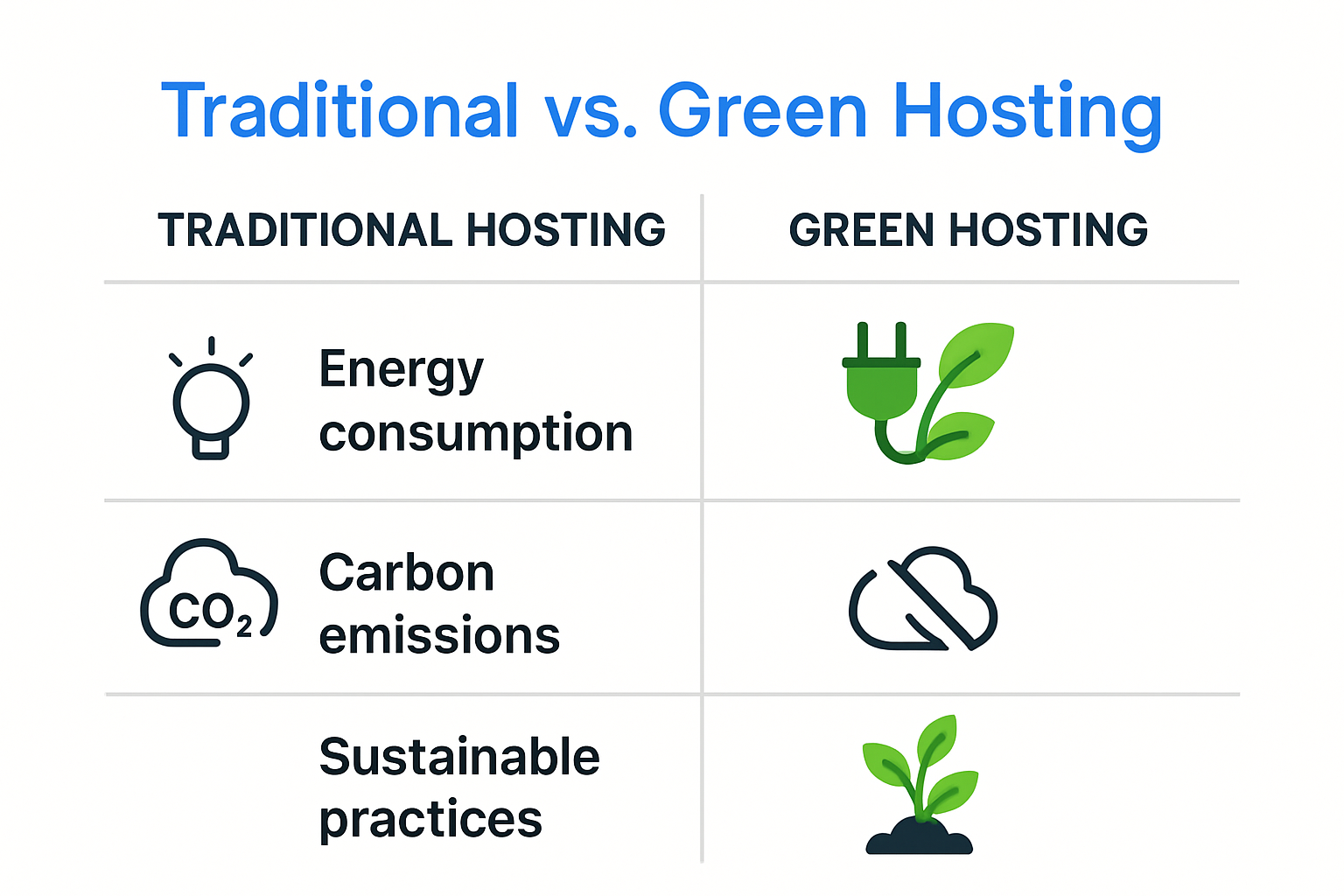Best Green Hosting Options for Businesses in 2025
Businesses might not realize just how much energy their websites consume. Traditional web hosting is responsible for data centers eating up around 200 terawatt hours of electricity every year , which rivals the energy demands of entire countries. Here is the wild part. Switching to green hosting does more than help the planet. The right provider can even trim your long-term costs and make your brand stand out among eco-conscious customers.
Table of Contents
- Understanding Green Hosting For Businesses
- Key Benefits Of Switching To Green Hosting
- Top Green Hosting Providers In 2025
- How To Choose The Right Green Hosting Option
Quick Summary
| Takeaway | Explanation |
|---|---|
| Adopt Green Hosting for Sustainability | Transitioning to green hosting reduces carbon emissions and supports environmental goals. |
| Evaluate Provider Sustainability Credentials | Ensure hosting providers demonstrate renewable energy use and carbon offset programs. |
| Focus on Brand Reputation Through Green Choices | Sustainable practices enhance brand image and attract eco-conscious customers. |
| Consider Long-Term Economic Benefits | Green hosting can lower energy costs and provide tax incentives. |
| Prioritize Technical Performance Alongside Sustainability | Choose providers that maintain robust performance while adhering to green principles. |
Understanding Green Hosting for Businesses
Businesses today recognize that digital infrastructure carries significant environmental implications. Green hosting represents a critical strategy for organizations seeking to reduce their carbon footprint while maintaining robust online presence and operational efficiency.
The Environmental Impact of Web Hosting
Traditional web hosting generates substantial carbon emissions through energy-intensive data centers. Research from the University of Berkeley reveals that global data centers consume approximately 200 terawatt hours of electricity annually, equivalent to the energy consumption of some entire countries. This massive energy demand translates into significant greenhouse gas emissions.
The Integrated Green Cloud Architecture (IGCA) framework proposes innovative approaches to managing cloud computing resources more sustainably. By implementing dynamic resource provisioning and intelligent allocation algorithms, businesses can dramatically reduce their environmental impact while maintaining high-performance digital infrastructure.

Key Principles of Green Hosting
Green hosting encompasses several critical strategies for minimizing environmental impact:
- Energy Efficiency : Utilizing renewable energy sources like solar and wind power for data center operations
- Carbon Neutrality : Investing in carbon offset programs to counterbalance remaining emissions
- Hardware Optimization : Implementing energy-efficient servers and cooling systems
Businesses adopting green hosting demonstrate commitment to environmental responsibility. This approach not only reduces ecological impact but also signals corporate social responsibility to environmentally conscious consumers and stakeholders.
The conceptual model for holistic resource management in cloud data centers emphasizes comprehensive strategies that go beyond simple energy reduction. Advanced research on cloud sustainability suggests that effective green hosting requires a multifaceted approach integrating technological innovation, strategic resource allocation, and continuous performance monitoring.
By understanding and implementing green hosting principles, businesses can achieve a delicate balance between technological performance and environmental stewardship. The transition represents more than an ecological choice—it is a strategic investment in sustainable digital infrastructure that aligns technological capabilities with global environmental objectives.
As digital transformation accelerates, green hosting will become increasingly crucial for businesses seeking to minimize their environmental footprint while maintaining competitive digital capabilities. Organizations that proactively embrace these principles will position themselves as forward-thinking leaders in the evolving digital ecosystem.
Key Benefits of Switching to Green Hosting
Business leaders increasingly recognize green hosting as more than an environmental initiative—it represents a strategic technological and economic opportunity. The transition to sustainable web infrastructure offers multiple compelling advantages that extend well beyond ecological considerations.
Environmental and Operational Efficiency
Research published in 2023 projects that data centers could consume 20% of global electricity and emit up to 5.5% of worldwide carbon emissions by 2025. By adopting green hosting solutions, businesses can directly contribute to mitigating these environmental challenges.
Server consolidation through virtualization emerges as a powerful strategy for reducing carbon footprint. Advanced research demonstrates that virtualization can increase server utilization ratios up to 50%, resulting in substantial energy savings and reduced operational costs. This approach not only minimizes environmental impact but also optimizes technological infrastructure.
To help clarify these key environmental and operational benefits, the following table summarizes major advantages of green hosting adoption discussed in this section:
| Benefit | Description |
|---|---|
| Reduced Electricity Consumption | Virtualization and efficiency lower overall power needs in data centers |
| Lower Carbon Emissions | Use of renewables and carbon offsets mitigates greenhouse gas impact |
| Server Consolidation | Increased server utilization (up to 50%) cuts wasted resources and energy |
| Operational Cost Savings | Energy savings directly translate into reduced business expenses |
Brand Reputation and Customer Perception

Green hosting extends beyond technical optimization—it represents a powerful statement of corporate social responsibility. Sustainable hosting practices enable businesses to enhance their brand image and appeal to environmentally conscious consumers.
Modern consumers increasingly evaluate companies based on their environmental commitments. By implementing green hosting solutions, organizations can:
- Demonstrate Environmental Leadership : Showcase commitment to sustainable practices
- Attract Eco-Conscious Customers : Appeal to demographics prioritizing environmental responsibility
- Differentiate from Competitors : Position the brand as forward-thinking and responsible
Economic and Performance Benefits
Contrary to common misconceptions, green hosting does not compromise performance. Advanced green hosting providers leverage cutting-edge technologies that deliver robust digital infrastructure while maintaining exceptional efficiency.
The economic benefits of green hosting include:
- Reduced Energy Costs : Lower electricity consumption through optimized infrastructure
- Potential Tax Incentives : Government programs supporting sustainable business practices
- Long-Term Cost Savings : Efficient resource allocation and reduced operational expenses
Businesses that proactively adopt green hosting solutions position themselves at the forefront of technological and environmental innovation. This strategic approach demonstrates a holistic understanding of modern business requirements—balancing technological performance, economic efficiency, and environmental stewardship.
As digital transformation continues to accelerate, green hosting will transition from a competitive advantage to an essential standard. Organizations that embrace these principles today will be well-prepared for the sustainable technological landscape of tomorrow.
Top Green Hosting Providers in 2025
The green hosting market has evolved significantly, offering businesses multiple options for sustainable digital infrastructure. As environmental responsibility becomes a critical business priority, selecting the right green hosting provider requires careful evaluation of performance, sustainability credentials, and technological capabilities.
Comprehensive Sustainability Criteria
Identifying top green hosting providers in 2025 demands a holistic assessment beyond simple energy consumption. TechRadar’s comprehensive analysis highlights key evaluation metrics including renewable energy commitment, carbon offsetting strategies, and technological efficiency.
Businesses seeking green hosting solutions should consider providers demonstrating:
- Renewable Energy Verification : Transparent documentation of energy sources
- Carbon Neutrality : Comprehensive offset programs
- Data Center Efficiency : Advanced cooling and resource management technologies
The following table summarizes the major sustainability criteria for evaluating green hosting providers as described above:
| Sustainability Criteria | What to Look For |
|---|---|
| Renewable Energy Verification | Transparent documentation of renewables (solar, wind, etc.) |
| Carbon Neutrality | Proven carbon offset or neutrality programs |
| Data Center Efficiency | Efficient cooling and resource management |
| Transparency | Detailed reporting on energy and carbon impact |
Leading Green Hosting Providers
WebHostinge.com’s 2025 review identifies several standout providers that excel in sustainable hosting solutions. These providers distinguish themselves through innovative approaches to reducing environmental impact while maintaining robust digital infrastructure.
Notable providers include:
- GreenGeeks : Recognized for 300% wind energy credits and EPA Green Power Partner status
- Providers Implementing Advanced Virtualization : Demonstrating server consolidation and energy optimization
- Companies with Comprehensive Carbon Offset Programs : Neutralizing digital infrastructure’s environmental footprint
Evaluating Provider Performance
Bioscore’s comparative guide emphasizes that selecting a green hosting provider involves more than environmental credentials. Businesses must balance sustainability with critical performance metrics such as uptime, speed, security, and scalability.
Key considerations include:
- Technical Performance : Ensuring hosting meets operational requirements
- Scalability : Capacity to support business growth
- Cost-Effectiveness : Competitive pricing alongside sustainability commitments
The landscape of green hosting continues to evolve rapidly. Businesses committed to environmental responsibility must remain adaptable, regularly reassessing their hosting infrastructure to align with emerging sustainable technologies and practices.
As digital transformation accelerates, green hosting transitions from a niche offering to a fundamental business requirement. Organizations that strategically select providers demonstrating genuine commitment to sustainability will not only reduce their environmental impact but also position themselves as responsible, forward-thinking enterprises in an increasingly eco-conscious marketplace.
How to Choose the Right Green Hosting Option
Selecting the appropriate green hosting solution requires a strategic approach that balances environmental responsibility with technological performance. Businesses must navigate a complex landscape of sustainability options, ensuring their digital infrastructure supports both operational needs and ecological commitments.
Evaluating Environmental Credentials
The Green Web Foundation emphasizes the critical importance of transparency in a hosting provider’s environmental claims. Businesses should conduct thorough due diligence by:
- Verifying Renewable Energy Sources : Requesting detailed documentation of energy procurement
- Assessing Carbon Offset Programs : Examining the specifics and verifiability of carbon neutrality claims
- Investigating Infrastructure Efficiency : Understanding the provider’s approach to energy-efficient data center management
According to their research, hosting accounts for approximately 15% of a website’s total energy usage, making the selection of a green web host a pivotal decision for environmental impact mitigation.
Technical Performance and Sustainability Alignment
The Integrated Green Cloud Computing Architecture research highlights the importance of balancing energy efficiency with technological capabilities. Businesses should consider multiple factors when selecting a green hosting option:
- Performance Metrics : Uptime, speed, and reliability
- Scalability : Ability to support business growth
- Energy Efficiency : Server utilization and resource optimization
The ideal green hosting solution should not compromise technological performance while maintaining a commitment to environmental sustainability. This requires a nuanced approach that evaluates both ecological and operational requirements.
Practical Selection Criteria
Navigating the green hosting landscape demands a comprehensive evaluation process. Key considerations include:
- Certification and Compliance : Look for providers with recognized environmental certifications
- Transparency : Seek detailed reporting on energy consumption and carbon offset efforts
- Total Cost of Ownership : Evaluate long-term economic and environmental benefits
Businesses should approach green hosting as a strategic investment rather than a simple procurement decision. This means looking beyond immediate costs and considering the broader impact on organizational sustainability goals.
The most effective green hosting solutions integrate seamlessly with a company’s overall digital strategy. They provide not just an environmentally responsible infrastructure, but a competitive advantage that demonstrates technological innovation and ecological commitment.
As digital technologies continue to evolve, the importance of sustainable hosting will only increase. Organizations that proactively develop a sophisticated approach to green hosting will position themselves as leaders in both technological and environmental responsibility.
Ultimately, choosing the right green hosting option is about creating a holistic strategy that aligns technological needs with environmental stewardship. It requires careful research, ongoing evaluation, and a commitment to continuous improvement in sustainable digital infrastructure.
Frequently Asked Questions
What is green hosting?
Green hosting is a sustainable web hosting approach that uses renewable energy sources to power data centers, reduces carbon emissions, and implements efficient technologies to minimize environmental impact.
Why should businesses switch to green hosting?
Switching to green hosting can help reduce carbon footprints, improve brand reputation among eco-conscious customers, and potentially lower long-term energy costs through efficient infrastructure.
How do I choose the right green hosting provider?
To choose the right green hosting provider, evaluate their sustainability credentials, technical performance, scalability, and transparency regarding their use of renewable energy and carbon offset programs.
What are the benefits of green hosting for businesses?
The benefits of green hosting for businesses include environmental and operational efficiencies, improved brand image, economic savings from lower energy costs, and enhanced performance without compromising on technological capabilities.
Ready to Take Your Sustainability Pledge Further?
Switching to green hosting is just the start if your business truly values a smaller carbon footprint and a forward-thinking online presence. You read how eco-friendly web infrastructure can set your brand apart and lower long-term costs. Still, building a modern digital platform that fully reflects your environmental goals can feel overwhelming. How do you tie together sustainable hosting, high-performing web design, and seamless functionality? Many businesses get stuck between wanting to make an impact and knowing where to begin. That is where specialized support becomes essential.

TRAVLRD builds conversion-driven websites and custom applications that integrate the latest green hosting solutions. Explore our portfolio and client stories . See how we have helped businesses like yours stand out with technology that works smarter for the planet. Stand out as an eco-leader while unlocking real business benefits. Visit TRAVLRD and request your free, pressure-free digital consultation today. Take ownership of your sustainable future before your competitors do.







